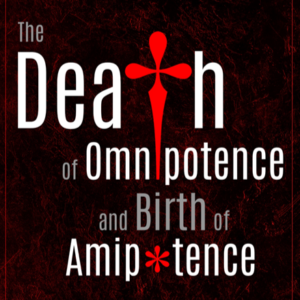Can God Decide to Stop Giving Life?
At the conclusion of The Death of Omnipotence and Birth of Amipotence, I address the question in this essay title. It comes in my discussion of amipotence, which is the power of God’s uncontrolling love.
The Spirit Gives Life
The divine Spirit provides integrity, agency, self-organization, and freedom to all creation, depending on their complexity. God gives robust freedom to complex creatures like you and me. God gives agency and self-organization to simpler creatures. And God gives the integrity of existence to the smallest entities.
The Spirit gives these gifts moment by moment and cannot override or dismiss any. These gifts from God are, to use the language of the Apostle Paul, “irrevocable” (Rom. 11:29).
God loves quarks, for instance, and that means giving them the integrity necessary for their “quarkness.” The same is true for cells, worms, sheep, and mountains. God gives the gifts of integrity, agency, and freedom to rats and cats, frogs and dogs, seeds, snakes, and civilizations. And the law-like regularities of existence emerge from God’s steadfast love for all creatures and creation.
Amipotence
Amipotence says that life is a divine gift, but it’s a gift God necessarily gives. (For the fundamental meaning of amipotence, see this blog essay.) An amipotent God, among whose attributes love comes first, must give freedom, agency, self-organization, and integrity to all creation, depending on their complexity. God cannot fail to provide, withdraw, or override the gifts given.
God loves necessarily.
The Spirit gives gifts not because some outside force, law, or factor forces this giving. God gives gifts because love gives gifts. Because God’s eternal and immutable nature is self-giving and others-empowering love, the Spirit must give integrity, self-organization, agency, and freedom to creatures and creation.
Omnipotence vs Amipotence
This drastically changes how believers think about divine power. In omnipotence, power comes logically first. Consequently, theologians who say God is all-powerful wonder why God would choose to create. Many claim God did so primarily to display sovereign glory.
Those who start with omnipotence also wonder if God will decide to share power after creating. They wonder if God will control creatures or circumstances from time to time.
Omnipotence theologians assume that mighty acts and miracles must be instances of God singlehandedly bringing about results. And the logic of omnipotence assumes God will someday use overriding power to make things right.
The logic of amipotence differs dramatically. It starts with God loving creatures: God is love. Love was and always is God’s reason for creating. Because God everlastingly loves, in fact, God everlastingly creates.
In the logic of amipotence, it’s never a question of whether God will share power. It’s the nature of love to do so. The theologian of amipotence never wonders why God doesn’t occasionally control others. Love, by nature, is uncontrolling.
Mighty deeds and miracles are the result of God’s initiation and creaturely responses or conducive conditions. Love’s ultimate victory will not come through absolute control but through relentless love. Feasting at heaven’s metaphorical banquet is possible through relentless amipotence, which persuades all to join the ways and power of love.
Love Synergy
According to amipotence, the divine-creation synergy wasn’t God’s afterthought, backup plan, or a late evolutionary addition. The Spirit’s synergy with creation is uncontrolling love at all times and all places. God necessarily gifts the elements of otherness to creatures great and small, to creation simple and highly organized, to all things now and forever.
The idea that God’s power is relational, uncontrolling, and synergistic makes a huge difference! And because God necessarily loves by necessarily giving life, God must give life to us and creation. It’s just who God is!


Comments